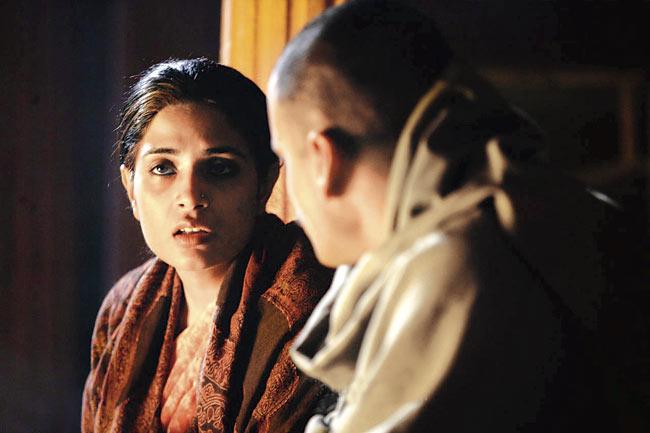There is no trace of Voldermort in Ralph Fiennes’ Gustave, the stylish concierge in The Grand Budapest Hotel

 There is no trace of Voldermort in Ralph Fiennes’ Gustave, the stylish concierge in The Grand Budapest Hotel. Actually there is no trace of Fiennes himself as Zero Moustafa takes you through the silly, sweet, charming and yet brave Gustave’s story. Moustafa (Tony Revolori), Gustave and the enterprising Agatha (Saoirse Ronan) combine to make the quirky The Grand Budapest Hotel a surprisingly delightful film. Fiennes’ performance reminded me in some ways of Sanjeev Kumar and Balraj Sahni. Both had the knack of becoming the character, of making you forget who they were.
There is no trace of Voldermort in Ralph Fiennes’ Gustave, the stylish concierge in The Grand Budapest Hotel. Actually there is no trace of Fiennes himself as Zero Moustafa takes you through the silly, sweet, charming and yet brave Gustave’s story. Moustafa (Tony Revolori), Gustave and the enterprising Agatha (Saoirse Ronan) combine to make the quirky The Grand Budapest Hotel a surprisingly delightful film. Fiennes’ performance reminded me in some ways of Sanjeev Kumar and Balraj Sahni. Both had the knack of becoming the character, of making you forget who they were.
ADVERTISEMENT

Richa Chaddha, who transforms brilliantly from a young bride to a harassed nag and then doting wife again in Gangs of Wasseypur shows that talent is coming out of the woodwork and finding the space to display itself in the new Indian film industry
That kind of talent, the one that can play a friend, a mum or a brother and yet leave its stamp on a role, is finally finding its way back into Indian cinema. Deepak Dobriyal as the spurned man who causes mischief in Omkara or as the hero’s best friend in Tanu Weds Manu is world-class. Here is a slight looking guy (saw him once at an Udupi restaurant in Versova and he is quite small built) who can pack the screen with so much energy, attitude and character that you hate him or love him at that moment. Or Richa Chaddha, who transforms brilliantly from a young bride to a harassed nag and then doting wife again in Gangs of Wasseypur. Kay Kay Menon as the sexually obsessed politician’s son in Sarkar or the stuck-in-the-mud Bengali in Honeymoon Travels or Huma Querishi in D-Day and Dedh Ishiya stay with you. I remember noticing Nawazuddin Siddiqui as the local reporter who first breaks Natha’s story in Peepli Live and hated him for being so obnoxious as the IB officer in Kahanii.
Where were these people and why have they started appearing only in the last five odd years. The talent was always there, but two things have worked to bring it out in such large numbers.
One, the film business has delivered, a point this column has made earlier. Till the late nineties the Indian film business was a basket case, marred by chaos and black money. To feed 1,000 seater theatres directors were making one-size fits all films, where the star and not the story was key. 1998 came industry status and institutional finance started flowing in. Then came multiplex chains and digital theatres. They helped collect money at the last mile and bring it back into the system. As a result the film industry has grown over five times its size in 2000. Major studios such as Eros, Disney and Yashraj are happy to pick up films by unknown writers and actors and back them with distribution and marketing muscle.
As studios grow, they want a portfolio of more and different films. This in turn is fuelling different kinds of films – big, small, medium. Many such as Jal or Shaitan are complete experiments, others such as Well Done Abba or Qissa get critical acclaim. Still others such as Delhi Belly or Kai Po Che manage to do the tightrope between commerce and creativity. But all need talent which is new, raw and willing to take risks and experiment.
There was pots of talent in the earlier decades too, but the way the business and industry was structured did not allow it to come out as often. So there would be sparks like Nina Gupta or Pankaj Kapoor (one of the most talented actors India has produced), but they rarely got stuff that could display their full range.
And that brings us to the second reason why complete unknowns have a better chance than ever of getting discovered. The current structure puts a lot of emphasis on planning. Scripts are written months in advance and casting directors are becoming a way of life. Note that most casting directors do not cast the lead roles, usually done by the producer or director. But everything else is usually left to a casting director. They plug into the script at an early stage and try fit characters that match the vision of the director.
And that is making a world of difference to our movies.
The writer is a media specialist and author. Follow her on twitter at https://twitter.com/vanitakohlik
 Subscribe today by clicking the link and stay updated with the latest news!" Click here!
Subscribe today by clicking the link and stay updated with the latest news!" Click here!






